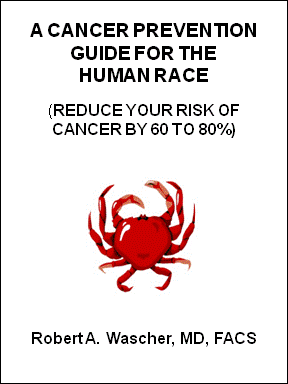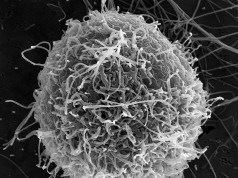By, Robert A. Wascher, MD, FACS
Updated: 07/05/2009
The information in this column is intended for informational purposes only, and does not constitute medical advice or recommendations by the author. Please consult with your physician before making any lifestyle or medication changes, or if you have any other concerns regarding your health.
BREAST CANCER RECURRENCE, DEATH & VITAMIN D
Based upon recent clinical research findings, Vitamin D is the only remaining vitamin that may have significant cancer and cardiovascular disease prevention properties. Recent large-scale prospective randomized clinical research trials have not only failed to identify a cancer prevention role (beyond a healthy balanced diet) for Vitamin E, Vitamin C, folate, and beta-carotene (a member of the Vitamin A family) supplements, but data from these trials have strongly suggested an increased risk of adverse health outcomes, at least in some sub-groups of patients, with supplements of several of these vitamins.
Alas, as is typically the case with public health studies, the clinical data regarding Vitamin D is not without inconsistency, and the data on Vitamin D and cancer incidence has not been uniformly positive, either. However, multiple recent epidemiological and prospective clinical research studies have at least suggested that low levels of Vitamin D in our bodies may, in fact, be associated with a higher risk of developing certain cancers (look for a more comprehensive review of the data on Vitamin D and cancer prevention in my forthcoming book, “A Cancer Prevention Guide for the Human Race”). Moreover, decreased blood levels of Vitamin D also appear to be linked to an increased risk of cardiovascular disease as well.
Now, a newly published prospective clinical research trial suggests that decreased levels of Vitamin D in the blood appears to be associated with an increased risk of breast cancer recurrence, and death due to breast cancer, in women previously diagnosed with early stage breast cancer. In this study, which has just been published in the Journal of Clinical Oncology, 512 women with early-stage breast cancer, diagnosed between 1989 and 1996, were prospectively followed for an average of nearly 12 years. Blood was routinely collected from all women following their diagnosis of breast cancer, as a part of this clinical research trial. The women were then closely followed for recurrence of their breast cancer, and for death due to breast cancer and other causes.
As with other similar studies, a surprisingly large number of these otherwise healthy women were discovered to have decreased levels of Vitamin D in their blood. In 38 percent of these women, Vitamin D levels were significantly below normal levels, while another 39 percent of these women had mildly decreased levels of circulating Vitamin D. Among these 512 women, 116 experienced metastatic recurrence of their breast cancer during the course of this prospective clinical study, while 87 women died with evidence of recurrent breast cancer.
The results of this prospective clinical study were rather compelling. The 10-year survival rates for these women with early-stage breast cancer varied significantly according to the level of Vitamin D in their blood. Survival at 10 years following breast cancer diagnosis was 74 percent, 85 percent, and 85 percent for women with significantly deficient, mildly deficient, and normal Vitamin D levels, respectively. Based upon the analysis of all of the data from this study, breast cancer patients with a significant deficiency of Vitamin D were observed to be almost twice as likely (71 percent increased risk) to experience a recurrence of their breast cancer, and they were 60 percent more likely to die, when compared to the patients who had normal levels of Vitamin D in their blood.
Although this clinical study included relatively few patients, it does, nonetheless, raise the possibility that a significant deficiency of Vitamin D may be associated with a worse prognosis in patients with early-stage breast cancer. Another related finding in this study was that very low levels of Vitamin D also appeared to be associated with breast tumors with more aggressive features when examined under the microscope, which is consistent with other studies that have suggested a link between “high grade” breast tumors and decreased blood levels of Vitamin D. At the same time, as I have already mentioned, the available data regarding Vitamin D levels (and the use of Vitamin D supplements) has not been consistent, and other clinical studies have failed to identify a link between Vitamin D and breast cancer risk. There is also some experimental data available suggesting that very high levels of Vitamin D in the blood may also be associated with poorer outcomes in women with breast cancer (similar findings have also been reported for excessive Vitamin D levels and cardiovascular disease outcomes). Taken together, the data from these various studies strongly suggest that there may be a fairly narrow “optimal range” of Vitamin D levels in the blood that are associated with a decreased risk of breast cancer, a decreased risk of breast cancer recurrence (and death), and a decreased risk of cardiovascular disease; and that excessively high or low levels of this vitamin may have adverse health effects in these areas.
The next obvious step is to conduct larger prospective clinical research trials that secretly randomize patient volunteers to receive various doses of Vitamin D, versus placebo (sugar) pills. There are several such studies already underway (or about to start), involving both cancer patients and patients without cancers. However, it will likely take another 10 years for mature data to emerge from these ongoing studies. Meanwhile, my advice is to eat a healthy and well-balanced diet. If you are a breast or prostate or colorectal cancer survivor, or if you have one or more risk factors for these cancers (or for cardiovascular disease), then you may also want to ask your physician to measure the level of active Vitamin D in your blood. If you are significantly deficient in Vitamin D, then your physician might consider the possibility of Vitamin D supplementation in conjunction with careful serial monitoring of your Vitamin D levels.
Disclaimer: As always, my advice to readers is to seek the advice of your physician before making any significant changes in medications, diet, or level of physical activity
Dr. Wascher is an oncologic surgeon, a professor of surgery, a widely published author, and a Surgical Oncologist at the Kaiser Permanente healthcare system in Orange County, California

(Anticipated Publication Date: March 2010)

(Click above image for TV36 interview of Dr. Wascher)
Send your feedback to Dr. Wascher at:
Dr. Wascher’s Biography
Links to Other Health & Wellness Sites
Copyright 2009
Robert A. Wascher, MD, FACS
All rights reserved
Dr. Wascher’s Archives:
8-2-2009: Honesty, Dishonesty & Brain Function
7-26-2009: Coronary Artery CT Scans & Cancer Risk
7-19-2009: Hormone Replacement Therapy (HRT) & Ovarian Cancer
7-12-2009: Breast Cancer & Metformin (Glucophage)
7-5-2009: Prostate Cancer & Green Tea
6-28-2009: Air Pollution & the Risk of Deep Venous Thrombosis (DVT)
6-21-2009: Red Yeast Rice, Statins & Cholesterol
6-14-2009: Bone Marrow Stem Cell Transplant & Congestive Heart Failure (CHF)
6-7-2009: Diet, Soy & Breast Cancer Risk
5-31-2009: Diet and Prostate Cancer Risk
5-24-2009: Diabetes, Glucose Control & Death
5-17-2009: Drug Company Marketing & Physician Prescribing Bias
5-10-2009: Hemorrhoids & Surgery
5-3-2009: Statin Drugs & Blood Clots (Thromboembolism)
4-26-2009: Are We Really Losing the War on Cancer?
4-19-2009: Exercise in Middle Age & Risk of Death
4-12-2009: Can Chronic Stress Harm Your Heart?
4-5-2009: Does PSA Testing for Prostate Cancer Save Lives?
3-15-2009: Depression, Stress, Anger & Heart Disease
3-8-2009: Coronary Artery Disease: CABG vs. Stents?; Swimming Lessons & Drowning Risk in Children
3-1-2009: Aspirin & Colorectal Cancer Prevention; Fish Oil & Respiratory Infections in Children
2-22-2009: Health Differences Between Americans & Europeans; Lycopene & Prostate Cancer
2-15-2009: Statin Drugs & Death Rates; Physical Activity, Breast Cancer & Sex Hormones
2-8-2009: Hormone Replacement Therapy (HRT) & Breast Cancer; Stool DNA Testing & Cancer of the Colon & Rectum
1-25-2009: Prostate Cancer, Fatigue & Exercise; Does your Surgeon “Warm-up” Before Surgery?
1-18-2009: Cancer and Vitamins; Teenagers, MySpace and Risky Behaviors
1-11-2009: Exercise Reverses Some Effects of Fatty Meals; Vitamin C and Blood Pressure
12-28-2008: Stress & Your Risk of Heart Attack; Vitamin D & the Prevention of Colon & Rectal Polyps
12-21-2008: Breast Cancer Incidence & Hormone Replacement Therapy; Circumcision & the Risk of HPV & HIV Infection
12-14-2008: Vitamin E, Vitamin C and Selenium Do Not Prevent Cancer; Postscript: A Possible Cure for Down’s Syndrome
12-7-2008: Generic vs. Brand-Name Drugs, Stress & Breast Cancer Survival
11-30-2008: A Possible Cure for Down’s Syndrome?; Smoking & Cognitive Decline; Calcium & Vitamin D & Breast Cancer Risk
11-23-2008: Breast Cancer & Fish Oil; Lymphedema after Breast Cancer Treatment; Vasectomy & Prostate Cancer Risk
11-9-2008: Statins Cut Heart Attack Risk Even with Normal Cholesterol Levels; Statins & PSA Level
11-2-2008: Radiation Treatment of Prostate Cancer & Second Cancers; Sexual Content on TV & Teen Pregnancy Risk
10-26-2008: Smoking & Quality of Life
10-19-2008: Agent Orange & Prostate Cancer
10-12-2008: Pomegranate Juice & Prostate Cancer
10-5-2008: Central Obesity & Dementia; Diet, Vitamin D, Calcium, & Colon Cancer
9-28-2008: Publication & Citation Bias in Favor of Industry-Funded Research?
9-21-2008: Does Tylenol® (Acetaminophen) Cause Asthma?
9-14-208: Arthroscopic Knee Surgery- No Better than Placebo?; A Healthy Lifestyle Prevents Stroke
8-23-2008: Alcohol Abuse Before & After Military Deployment; Running & Age; Running & Your Testicles
2-23-2008: Universal Healthcare Insurance Study; Glucosamine & Arthritis
2-3-2008: Vitamin D & Cardiovascular Health; Vitamin D & Breast Cancer; Green Tea & Colorectal Cancer
1-12-2008: Statins, Diabetes & Stroke and Obesity; GERD & Esophageal Cancer
12-31-2007: Minority Women, Hormone Replacement Therapy & Breast Cancer; Does Health Insurance Improve Health?
Updated: 08/09/2009





